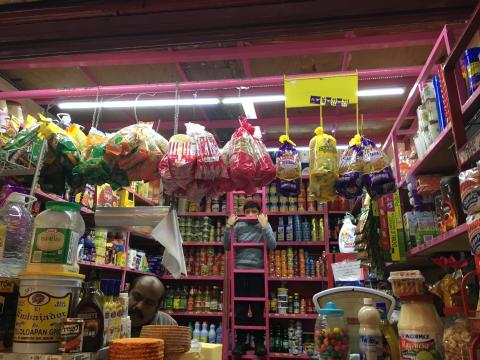Nanostores are the backbone of emerging economies, but they need stronger supply chains
Small independent shops are the backbone of emerging economies. Supporting the supply chains of these so-called “nanostores” is crucial for both shopkeepers and the local consumers who depend on them for food and other necessities, argues PhD researcher Rafael Escamilla in his dissertation.
Across the world, billions of people depend on small local shops for access to basic goods and services. “Nanostores form the dominant retail channel in emerging markets,” says Rafael Escamilla. In his doctoral thesis, he examines how supply chains can be improved to support nanostores—and the local consumers they serve—in low-income countries.
Escamilla looked at financial, material and information flows in nanostore supply chains, identifying current obstacles and potential solutions.

Keeping the shelves stocked without a bank loan
One of the current difficulties faced by nanostores is that suppliers generally require immediate payment when products are delivered to the shop, while most shopkeepers don’t have large cash reserves or access to bank loans. For nanostore owners, it can be a struggle to keep their shop stocked.
A delayed payment alternative could offer a simple but effective solution, Escamilla found. He termed this alternative “order-based trade credit” and empirically explored the financial risks and benefits that come with it. His conclusion: allowing shopkeepers to delay order payment by a short period of time leads to important operational benefits for suppliers, while shopkeepers benefit from this increased access to credit.
Digitalization: what's holding shopkeepers back?
Escamilla also examined how digitalization could help transform the operations of nanostores in emerging economies. While nanostores have a lot to gain from using digital technologies such as mobile phones and cashless payment systems, shopkeepers are hesitant to digitize their business. One thing that's holding them back is the cost of going digital, but there is also another concern: shopkeepers fear that their operational data will become transparent to the government.
Shopkeepers in emerging markets distrust the government, Escamilla found, and tax privacy concerns are an important reason for them to stick with traditional business practices. Tax privacy concerns could be alleviated by positive word of mouth around the unlikeliness of operational data being shared with tax authorities. Combined with lowering the price of adopting digital technologies, this may give the nanostore supply chain the digital boost it needs.
Impact on people's livelihoods
Throughout his dissertation, Escamilla shows that the private market has a key role to play in creating supply chains that work for nanostores, and the local shoppers who depend on them for necessities, in lower-income countries.
Strengthening nanostore supply chains through private sector solutions can be the key to improving access to credit, boosting digitalization and ensuring access to basic products and services. “This has the potential to impact the livelihood of millions of shopkeepers and billions of consumers in the emerging world,” Escamilla says.
-

Rafael Escamilla
Tilburg School of Economics and Management (TiSEM)Rafael Escamilla is a PhD researcher at the Tilburg School for Economics and Management (TiSEM). He will defend his PhD thesis on 12 September at 14.00 in the Portraits room of the Cobbenhagen building at Tilburg University.
Title thesis: Managing the Nanostore Supply Chain: Base-of-the-Pyramid Retail in Emerging Markets. Supervisors: Prof. J.C. Fransoo and Prof. P. Brosi. The defense will be livestreamed.
Note for the press
For more information, please contact Rafael Escamilla (r.escamilla@tilburguniversity.edu) directly, or get in touch with TiSEM's science communicator Laura van Gelder (l.f.vangelder@tilburguniversity.edu).
